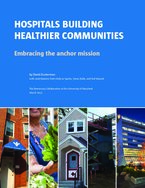Found 6 resources.
0
0
0
Looking largely at the 2020-2021 school year, the report is chock-full of information about how schools apply research-based strategies in a variety of different contexts – from very different school systems across multiple states – to make research translate into positive experiences and outcomes for students and their teachers in three critical areas:
• Instructional work, where math or English-language-arts teams, including instructional coaches, special-education teachers, and English learner/multilingual teachers, work to improve the quality of instruction within classrooms.
• Early...
Topics: Advocacy, Attendance, Child welfare, CLPHA, Community development, Education, Grade-level proficiency, Housing, Literacy, Low-income, Partnerships, Place-based, Supportive housing, Sustainability, Youth
 Shared by Karina George
on Jun 29, 2022
Shared by Karina George
on Jun 29, 2022 0
0
0
CLPHA developed a general data sharing template that public housing authorities (PHAs) and their health partners can customize to suit their data sharing and collaboration needs. Please feel free to comment to share any uses/modifications your organization made to implement into a partnership.
Topics: Affordable Care Act, CLPHA, Community development, Cost effectiveness, Data sharing, Dental, Depression, Dual-eligibles, Funding, Health, Healthy homes, Legislation & Policy, Low-income, Medicaid / Medicare, Mental health, Metrics, MTW, Nutrition, Obesity, Partnerships, Place-based, Preventative care, Racial inequalities, Research, SAMHSA, Smoke-free, Stability, Substance abuse, Supportive housing, Sustainability, TA
 Shared by Steve Lucas
on Aug 5, 2019
Shared by Steve Lucas
on Aug 5, 2019 0
0
0
CLPHA’s Housing Is Initiative is engaged in a number of cross-sector activities focused on developing partnerships, facilitating a community of practice, resource development, promoting best practices, online collaboration, policy and advocacy, and training and education. Read about recent activities in this Fall Update.
Topics: Child welfare, CLPHA, Community development, Cost effectiveness, Data sharing, Early childhood, Education, Family engagement, Funding, Health, Homelessness, Housing, Low-income, Medicaid / Medicare, Mental health, Partnerships, Place-based, Post-secondary, Research, Stability, Substance abuse, Workforce development, Youth
0
0
0
The link between federal housing policy and public health has been understood since the nineteenth century, when housing activists first sought to abolish slums and create healthful environments. This article describes how the Obama administration—building on these efforts and those that followed, including the Great Society programs of President Lyndon Johnson—has adopted a cross-sector approach that takes health considerations into account when formulating housing and community development policy. The federal Department of Housing and Urban Development fully embraces this “health in all...
Topics: Affordable Care Act, Community development, Disabilities, Health, Healthy homes, Housing, Legislation & Policy, Low-income, Mobility, Partnerships, Place-based, RAD, Research
 Shared by Housing Is
on Jul 19, 2018
Shared by Housing Is
on Jul 19, 2018 0
0
0
Hospitals Building Healthier Communities aims to provide a resource for hospitals considering adopting or further integrating community engagement and economic development into their daily operations and their core mission.
Topics: Community development, Data sharing, Health, Housing, Low-income, Partnerships, Place-based, Research
 Shared by Housing Is
on Jul 13, 2018
Shared by Housing Is
on Jul 13, 2018 0
0
0

Why do some neighborhoods appear able to launch effective local improvement initiatives, while others are more hampered by fragmentation and mistrust? Why can some communities mobilize diverse constituencies to influence public policy, while others cannot? Answers to these questions may be found in the specific patterns of collaboration that form among community organizations, and between these groups, schools, public agencies, and elected officials, according to MDRC, a preeminent social-policy research organization.
Topics: Asset building, Child welfare, Community development, Data sharing, Dual-generation, Education, Family engagement, Funding, Health, Housing, Legislation & Policy, Low-income, Metrics, Midwest, Mobility, Out-of-school time, Partnerships, Place-based, Preventative care, Research, Safety, Stability, Workforce development, Youth



